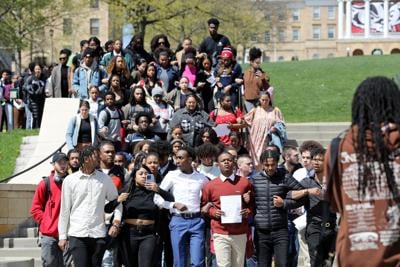Lawmakers in the state Assembly approved a constitutional amendment Thursday to ban state agencies — including the Universities of Wisconsin — from using race, sex, ethnicity and other factors in hiring decisions and public accommodations.
The move is the latest front in opposition from state Republicans to diversity, equity and inclusion efforts in state government, most notably in the state’s four-year universities.
But unlike other bills or budget items considered in the Legislature, the amendment would not be able to be vetoed by Gov. Tony Evers. In order for it to be enacted, the amendment must be again approved next year, at which point it can be added to the ballot. It then must be approved by a majority of voters.
The amendment prevents governmental agencies from “discriminating against, or granting preferential treatment to” individuals on the basis of race, sex, color, ethnicity, or national origin. It would apply to not just hiring but in contracting decisions and admissions at universities, among other areas.
The amendment’s author, Rep. Dave Murphy, R-Greenville, has said the language was based on a measure approved in Michigan in 2006, which banned affirmative action programs in state universities. The allowability of that language was eventually upheld by the U.S. Supreme Court.
The idea, he said, is to shift hiring to be based on “merit, fairness and equality,” which has gotten traction in conservative circles as an alternative to DEI.
"Rooting out racial discrimination takes a lot of work but a constitutional amendment, not just another statute, will go a long way to address inequality," Murphy said on the Assembly floor.
He pointed to inconsistencies in hiring practices across state government, with different agencies defining certain minority groups differently.
"It is hard to understand exactly where these lines are being drawn," Murphy said.
Critics argued the measure was "divisive" and that there was no evidence of preferential treatment being granted on a large scale.
"This notion that there's a preferred treatment is just not true," Rep. Sylvia Ortiz-Velez, D-Milwaukee, said. "I welcome anyone to point to data that shows when it comes to public employment, public education, public contracting, or public administration that there's a disproportionate amount of benefits to marginalized communities."
Greg Jones, president of NAACP Dane County, told legislators during a public hearing last month that existing federal and state protections would guard against discrimination during the hiring process.
“This bill is based on unfounded principles and false assumptions,” Jones said.
The debate comes as Assembly Speaker Robin Vos, R-Rochester, has said he is intent on eliminating DEI programming from state agencies. Lawmakers also passed a bill late last year that would ban the consideration of race in some college financial aid programs.
A deal brokered with the UW system last year ended a standoff where Vos had blocked pay raise for university staff, among other policy priorities, over his ire at their DEI efforts.
The agreement freezes the number of positions devoted to DEI and repurposes some of the existing staff members. It was panned by legislative Democrats and many students and faculty as selling out people of color in the UW community.
But state governmental agencies have a range of programming designed to help both state workers who come from underrepresented communities but also Wisconsinites of color and women more broadly.
The Department of Corrections, for instance, has an advisory committee dedicated to equity and inclusion issues, including hiring a diverse workforce and creating “inclusive environments” that are free from bias.
And the Wisconsin Economic Development Corporation has a program to direct funding and support to businesses owned by minorities, women, members of the LGBT community, those with disabilities and veterans.
The University of Wisconsin-Madison, meanwhile, agreed as part of the pay raise deal to end its Target of Opportunity Program, which helps academic departments recruit diverse faculty, by the end of this academic year.






